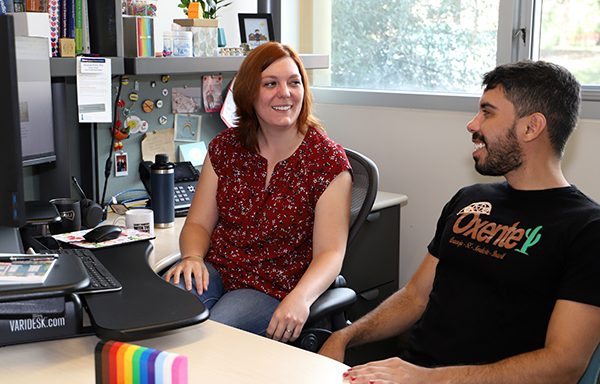Spotlight: Amanda Pollitt

With an extensive background in LGBTQ health equity, Amanda Pollitt adds a new and important specialization focus to the Center for Health Equity Research’s burgeoning offerings.
Though she only arrived at CHER a year ago, she quickly assimilated and is already working with the data team on collecting and analyzing data for the Community-Engagement Research Alliance Against COVID-19 in Disproportionately Affected Communities grant.
She also coauthored a publication with Sara Shuman, assistant clinical professor in NAU’s Department of Health Sciences, on intimate partner violence among unauthorized immigrant women, now published in the Journal of Interpersonal Violence.
Pollitt said that even though it was difficult to move during a pandemic, it wasn’t difficult for her to accept the job at CHER.
“This position was my top choice even before I interviewed,” she said. “So although this past year was not how I was expecting to start an assistant professor position, I kept reminding myself of all the things I was excited about: my new colleagues, CHER and Flagstaff. I’m excited to be here.”
Prior to arriving at CHER, Pollitt earned her doctorate at the University of Arizona in Family Studies and Human Development, then completed a postdoctoral fellowship at the University of Texas at Austin.
Pollitt said that she wanted to become a clinical psychologist until she spent a year as a crisis worker at a rural hospital in her hometown. She said she realized then that her heart was in research.
“Even though I thought I wanted to go into clinical psychology, I didn’t have a clear sense of what I wanted to specialize in,” she said. “I was looking into potential faculty mentors when I found someone studying LGBTQ health; I suddenly had this immediate gut feeling of,‘That’s what I want to do!’”
She said it wasn’t until sometime later that she realized that she was drawn to this topic because of her own sexuality as well as a strong sense of social justice.
“I might not be a ‘boots on the ground’ activist, but I can support the work of others through my research,” Pollitt said. “Ultimately, this led me to the work of Stephen Russell, who at that time was faculty at the University of Arizona in Family Studies and Human Development. I had no idea that interdisciplinary fields like that existed, and it ended up being a perfect fit.”
She said that Russell was an “incredibly supportive mentor” who took her with him when he moved institutions to the University of Texas at Austin. She was still a doctoral student at UA, and was also involved in the Population Research Center. She was able to do postdoctoral fellowship with Debra Umberson, a professor of sociology and director of the Center on Aging and Population Sciences at UT.
“Her work on gender, social contexts, and health really shaped how I research sexual and gender minority health disparities,” Pollitt said of Umberson. “Both Stephen and Deb pushed me to think carefully about how broader social systems impact health. I was very lucky to have brilliant, supportive mentors.”
She said that her mother was also a strong mentor in her life. Though neither of her parents finished high school, her mother was adamant about her pursuing her education.
“She did everything she could to ensure I had every educational opportunity possible,” Pollitt said.
She said her mother worked three jobs, all while applying for scholarships for her daughter, so she could attend summer programs and other activities she was passionate about.
“She sacrificed a lot and I wouldn’t be here if it weren’t for her,” Pollitt said. “She’s an incredible woman.”
Looking toward the future, she recently submitted an application to the National Institutes of Health to fund her “dream project” on relationship quality and health among bisexual young adults.
“It’s been a busy year,” Pollitt said. “I’m excited about the opportunity to expand CHER’s research focus on sexual and gender minorities.”